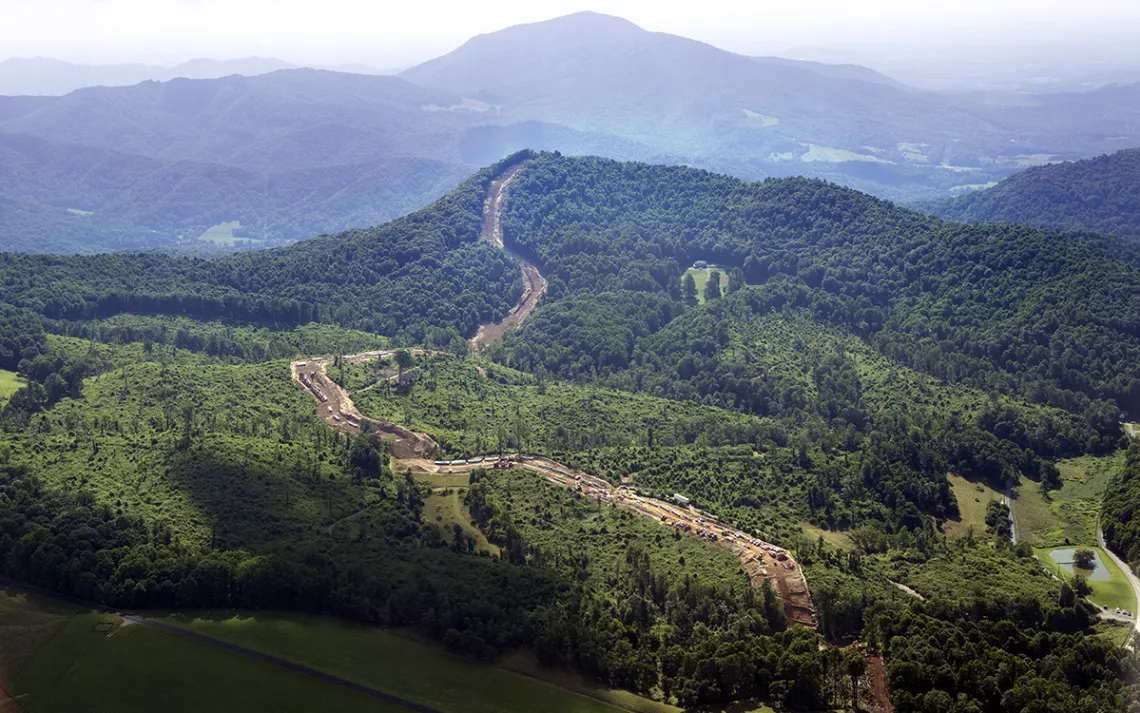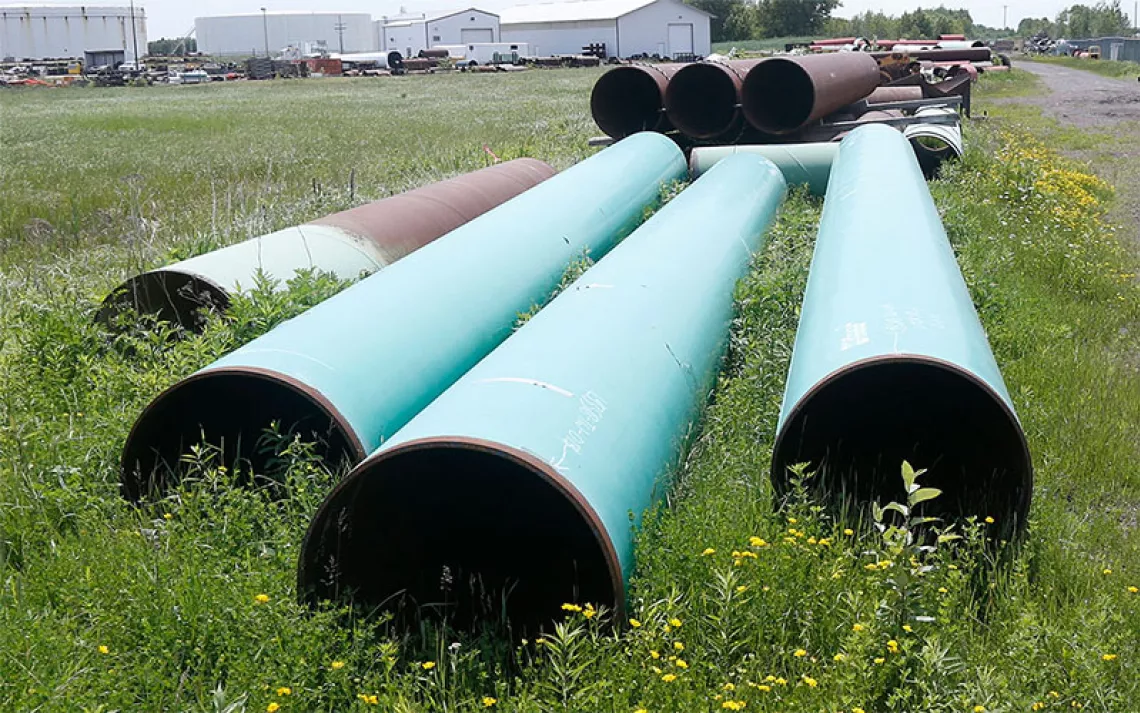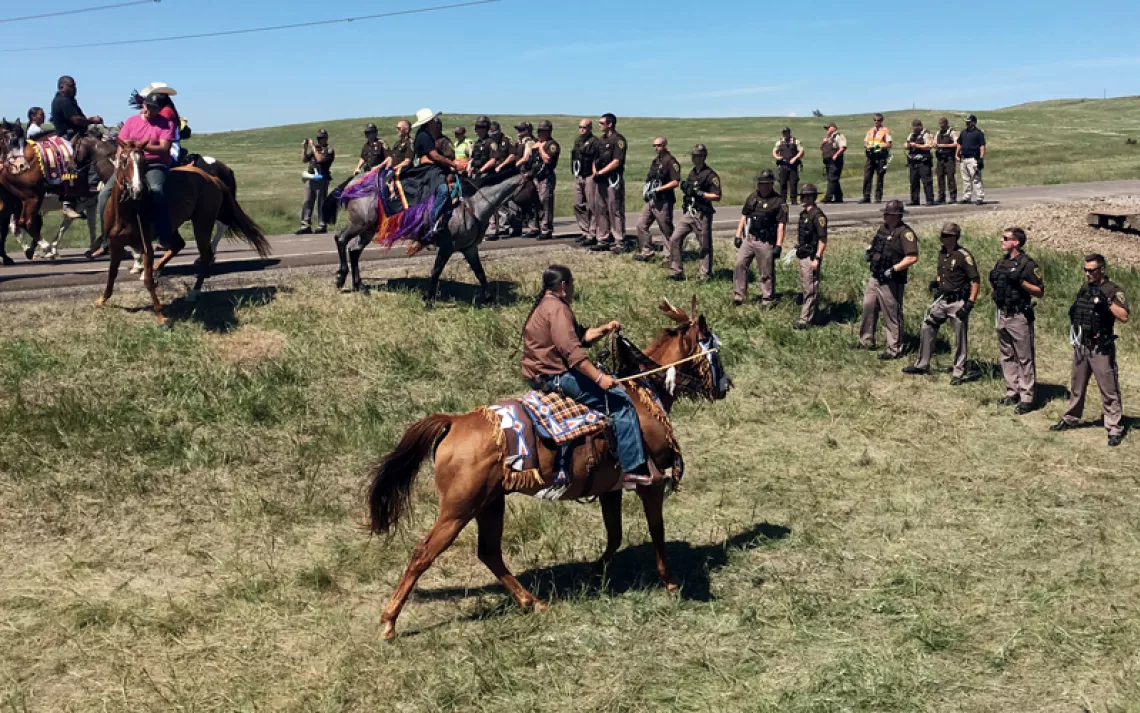Resistance to Southeast Pipelines Gains Momentum
Mountain Valley and Atlantic Coast Pipelines delayed

Cahas Mountain looms over the path of the Mountain Valley Pipeline. | Photo by Heather Rousseau /The Roanoke Times via AP Images
Two controversial gas pipelines in the South are in trouble after federal judges and regulators questioned whether their impacts had been adequately studied. On August 3, the Federal Energy Regulatory Commission halted construction along the entirety of the Mountain Valley Pipeline after agreeing with a federal court ruling that 3.6 miles of its route through the Jefferson National Forest in Virginia hadn’t been properly considered. Then, just three days later, a three-judge panel with the U.S. Fourth Circuit of Appeals threw out two key permits for the Atlantic Coast Pipeline to pass under the Blue Ridge Parkway, forcing a significant delay.
Environmental groups are thrilled with the twin decisions.
“This is an example of what happens when dangerous projects are pushed through based on politics rather than science,” Southern Environmental Law Center attorney D.J. Gerken said in a statement regarding the Atlantic Coast Pipeline delay. “This pipeline project was flawed from the start, and [developers] Dominion and Duke’s pressure tactics to avoid laws that protect our public lands, water, and wildlife are now coming to light.”
 The Mountain Valley Pipeline (MVP) is a proposed 300-mile pipeline that, if completed, would go through West Virginia and Virginia, along the way cutting through vast swathes of Appalachian hardwood forest and crossing the iconic Appalachian Trail. Nearly 600 miles long, the Atlantic Coast Pipeline is even bigger. It would slice through West Virginia, Virginia, and North Carolina to deliver gas throughout the Southeast. The pipelines have drawn opposition from the Appalachian Trail Conservancy, the National Resources Defense Council, and the Sierra Club, which fear that the new gas infrastructure will exacerbate greenhouse gas emissions. There are also concerns about the lines’ impact on water quality; the lines pass through karst terrain, which is especially vulnerable to landslides and other disruption.
The Mountain Valley Pipeline (MVP) is a proposed 300-mile pipeline that, if completed, would go through West Virginia and Virginia, along the way cutting through vast swathes of Appalachian hardwood forest and crossing the iconic Appalachian Trail. Nearly 600 miles long, the Atlantic Coast Pipeline is even bigger. It would slice through West Virginia, Virginia, and North Carolina to deliver gas throughout the Southeast. The pipelines have drawn opposition from the Appalachian Trail Conservancy, the National Resources Defense Council, and the Sierra Club, which fear that the new gas infrastructure will exacerbate greenhouse gas emissions. There are also concerns about the lines’ impact on water quality; the lines pass through karst terrain, which is especially vulnerable to landslides and other disruption.
The grassroots campaigns and legal challenges against the ACP and MVP are just some of the latest battles for the larger “keep it in the ground” movement in the United States. The Huffington Post has called the resistance to the projects “Virginia’s Standing Rock.” This spring, a mother-daughter pair climbed into trees on their property and stayed there for five weeks to protest the MVP’s route through their land. Residents along the route of the MVP have conducted their own independent investigations of possible pipeline impacts. ACP and MVP opponents have received solidary visits from other fossil fuel resisters who have come from as far away as the Dakotas and Oklahoma.
Now, resistance to the two piplines is coming from a new direction as racial-justice advocates raise concerns that the projects will disproportionately impact communities of color. On July 30, the group Virginia Wild released a letter from the Virginia NAACP to the Virginia Department of Environmental Quality (DEQ), dated May 30, that detailed the civil rights organization’s objections to the Mountain Valley and Atlantic Coast Pipelines.
The letter states, “Consideration under the U.S. Army Corps of Engineers is inadequate and grossly neglects to consider the magnitude of both projects and the massive disruptions to surrounding communities and the environment that will result.” The NAACP letter goes on to call for a construction halt on both pipelines.
“[The statement] is helping us bring national attention and bring broad-based support to this, so we really appreciate it,” said Pastor Paul Wilson, whose two congregations, Union Hill Baptist Church and Union Grove Baptist Church, both in Buckingham County, Virginia, are near the route of the ACP. Wilson has been a longtime opponent of the project.
“The Atlantic Coast Pipeline and Mountain Valley Pipeline go through some locales where they are predominantly African American, and whenever a pipeline goes through a community, it tends to decrease the value of their property,” said NAACP Virginia Chapter president Reverend Kevin Chandler. Chandler said that the DEQ had not responded to the NAACP’s concerns. The state agency did not release the comments; Wild Virginia obtained them and many others through a Freedom of Information Act request.
Union Hill, in Buckingham County, Virginia, is at the center of the debate about the ACP. The developers have proposed placing a compressor station for the ACP in Union Hill, much to the distress of local residents. Union Hill was founded by freed slaves after the Civil War and today remains about 85 percent African American. Lakshmi Fjord, a visiting scholar at the University of Virginia who lives in Buckingham County, argues that the placement of the ACP disproportionately hurts communities of color. “I have spent four years investigating and doing the research to prove that it is environmental racism to locate the only Virginia compressor station for the ACP in Union Hill specifically,” she said. Fjord said she was “thrilled” that the Virginia NAACP had decided to make a statement, which the community had been lobbying for.
Compressor stations are necessay to pump gas through the vast pipeline systems. The one proposed near Union Hill would be a gas-fired, 50,000-horsepower facility, which could have serious impacts in terms of fugitive gas emissions and air quality, noise, and public safety. Despite the industry’s claim that gas is “cleaner,” research demonstrates that gas pipelines compromise air quality in the communities where they are built.
“Compressor stations and projects like this are usually put in minority-style communities and areas . . . it’s an African American community, and there are quite a number of us that will live within a mile of the proposed compressor station,” Pastor Wilson said. “It causes economic injustice to our community. It inhibits future development for our community, which is why we are dead set against it. It is a project based on what we feel is a false conversation, built on many untruths by the industry.” Some of Wilson’s congregants live in walking distance of the proposed site of the compressor station.
Although Dominion has claimed that the project will be safe, Chandler of the NAACP is unsure. “They are focusing on the safety, saying they’ve taken all the precautions, but even with those, disasters could happen,” Chandler said. “And if it happens, the citizens are going to suffer.”
There is also debate about whether the ACP will bring much economic benefit to ordinary Virginians. Dominion claims pipeline construction will generate 17,000 jobs, but opponents disagree.
Doug Wellman, vice president of a grassroots organization called Friends of Nelson County, described a recent incident that made him wonder if Dominion would be hiring any locals at all. “They came here to clear trees, and they didn’t even use a local crew,” Wellman said. “They brought in an all-out-of-state crew, and they just cut down the trees and left them. They are still there. They were clearly trying to demoralize us, to embarrass the resistance,” he added. “The losses would outweigh the benefits for the county.”
Pastor Wilson sees the pipeline resistance as part of his racial-justice work. “Communities such as ours are always ignored in projects like this and left out of the conversation,” he said. “This whole thing, it’s about more than pipelines.”
 The Magazine of The Sierra Club
The Magazine of The Sierra Club



